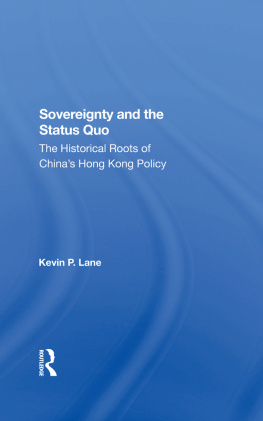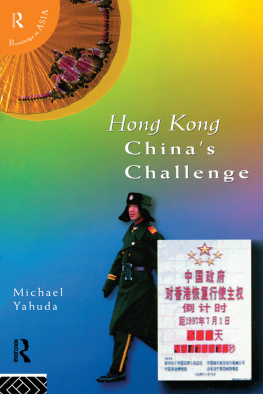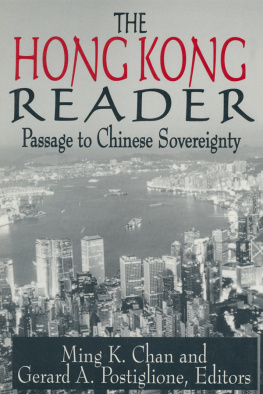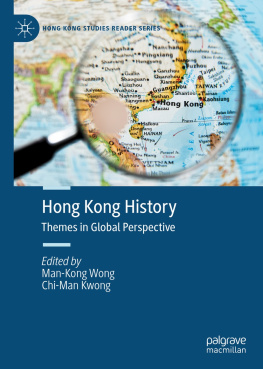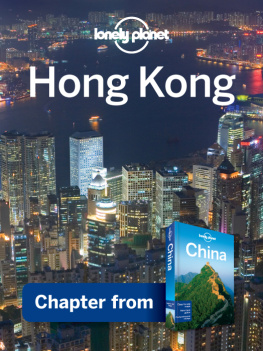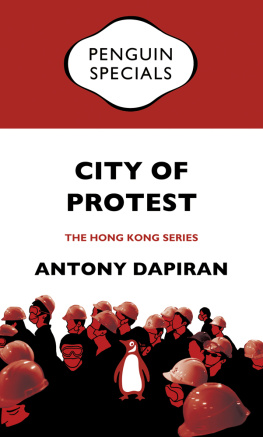Sovereignty and the Status Quo
Sovereignty and the Status Quo
The Historical Roots of China's Hong Kong Policy
Kevin P. Lane
First published 1990 by Westview Press, Inc.
Published 2019 by Routledge
52 Vanderbilt Avenue, New York, NY 10017
2 Park Square, Milton Park, Abingdon, Oxon OX14 4RN
Routledge is an imprint of the Taylor & Francis Group, an informa business
Copyright 1990 Taylor & Francis
All rights reserved. No part of this book may be reprinted or reproduced or utilised in any form or by any electronic, mechanical, or other means, now known or hereafter invented, including photocopying and recording, or in any information storage or retrieval system, without permission in writing from the publishers.
Notice:
Product or corporate names may be trademarks or registered trademarks, and are used only for identification and explanation without intent to infringe.
Library of Congress Cataloging-in-Publication Data
Lane, Kevin.
Sovereignty and the status quo: the historical roots of China's Hong Kong policy/Kevin P. Lane.
p. cm.(Westview special studies on China and East Asia)
Includes bibliographical references.
ISBN 0-8133-7681-5 (lib. bdg.)
1. Hong KongHistory. 2. Hong KongPolitics and government.
I. Title. II. Series.
DS796.H757L36 1990
951.25dc20 89-78301
CIP
ISBN 13: 978-0-367-28809-9 (hbk)
For John V. and Patricia M. Lane
This book is a "must" for all interested in Hong Kong. Lane's excellent analysis of its past and present provides invaluable background for considering its future.
To speculate about this future one must at least start with understanding the facts about Hong Kong's survival hitherto. Lane sets these out selectively and readably, and he successfully avoids confusing the facts with his conclusions from themwhich show great insight.
I hope the contents of this book will be studied. They record the decades of patience, compromise and mutual restraint that have permitted Hong Kong's remarkable success. Readers may find surprising the degree of flexibility that China has contributed to this process and may reflect on what has been done and not done by the British that has assisted.
Lane believes that on historical track record China has the capacity for flexibility on Hong Kong that would enable arrangements about its future to work successfully; if this may not be conclusive, it is encouraging.
Lord MacLehose
former governor of Hong Kong
Beoch, Scotland
In the course of researching and writing this book, I have depended heavily on the support and assistance of others, Dartmouth College's James B. Reynolds Scholarship provided generous financial support for my research in Hong Kong. At Dartmouth, Susan Blader, Charles MacLane, Hua-yuan Li Mowry and Laurence Radway were inspirational teachers who provided crucial advice and encouragement during the initial stage of research.
At The Chinese University of Hong Kong, Kuan Hsin-chi was a patient teacher and insightful critic who gave generously of his time, even when the project lasted much longer than he probably had expected. Peter Lee was both friend and teacher, making me feel at home in Hong Kong and offering perceptive comments on the manuscript. The administration and staff of the International Asian Studies Programme at Chinese University were extremely helpful in facilitating my research in Hong Kong. Terry Lautz, Thomas Lee and Mark Sheldon welcomed me into the university community and opened many doors that helped make the research possible. Josephine Mak and Fannie Chow patiently answered my daily questions about how to get around Hong Kong and gave me frequent help with the Cantonese dialect. The librarians and staff at Chinese University and the University of Hong Kong libraries provided professional and efficient assistance, as did the staff at Chinese University's computer center.
At Harvard University, Roderick MacFarquhar offered helpful suggestions on the manuscript and provided guidance and assistance throughout the process of revision and publication. Jacques de Lisle provided insightful criticisms and served as a constant source of advice on various aspects of the book's publication. Yuen Foong Khong and Ezra Vogel gave generously of their time to read the manuscript and offer valuable suggestions. Nancy Hearst provided much useful bibliographical advice and was a constant source of good humor. My wife, Page, patiently provided encouragement, advice and expert assistance. She has helped make this project truly enjoyable.
The generous assistance of these people has improved the book and taught me a great deal. The errors that remain are mine alone.
Kevin P. Lane
Since this book covers a long historical period and includes names and terms from both Cantonese and Mandarin, romanization is somewhat problematic. In order to minimize confusion, no attempt is made to standardize all words according to a single system. Rather, the book simply uses the most common romanizations of names and terms from Cantonese and Mandarin. Most references to the Nationalist period use Wade-Giles, and those from the CCP period use pinyin. For those words that are known in more than one system, pinyin is favored. Likewise, most place names are romanized using the pinyin system, except those that are commonly known otherwise (such as locations in Hong Kong). "Canton" is used throughout the book to refer to the city also known as Guangzhou, and "Guangdong" refers to the province adjacent to Hong Kong. "Beijing" is used consistently in favor of "Peking" or "Peiping."
K.P.L.
1
The Hong Kong Question
Since Prime Minister Margaret Thatcher's historic visit to Beijing in September 1982, considerable attention has been focused on the question of Hong Kong's future. The planned return of Hong Kong to the People's Republic of China in 1997, after 155 years as a British colony, has inspired widespread speculation about the future of its lifestyle and economy. The issue has dominated media coverage in Hong Kong and has received increasing attention in the West. Scholarly research on Hong Kong also has grown dramatically since the early 1980s. The nature of Hong Kong's relationship with the mainland, the process of negotiating the Sino-British agreement on Hong Kong's future, the drafting of Hong Kong's post-1997 Basic Law, and the territory's internal political developments are among the issues that have become popular subjects for research and analysis.
Such widespread concern with the "1997 question" or "Hong Kong question," as the issue has come to be known, is understandable. The return of ceded and leased territory to its original owner, while not unprecedented, is highly unusual in the history of decolonization. The issue is made more complex by Hong Kong's status as one of the world's largest international financial centers, a bastion of laissez-faire capitalism that has experienced one of the world's most impressive rates of economic growth over the past three decades, and the home of a large number of refugees from the Chinese mainland. The prospect of integrating the colony into the underdeveloped, socialist PRC has created unique challenges for the British and Chinese governments. The outcome of their work will have important implications for Sino-British relations and for Hong Kong's role in the international economy.

